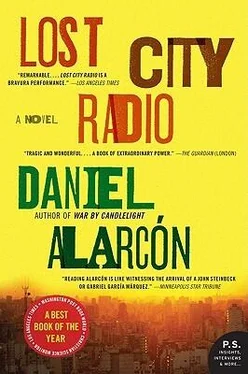“Should we stay?” Norma had appeared at his side, quite suddenly, and her presence made him feel warm. All night he had missed her.
“Do you want to?”
She shrugged, then smiled. She did.
“Are you drunk?” he asked, and she smiled some more.
Many had already left, but now the lights were low, and hours had passed, and among those who stayed, it was as if an animal had been loosed. The scene was unrecognizable. The music was being played at a furious volume, the great room overwhelmed with dancers. It had happened all at once, a lightning strike. The staid function had been replaced with a bacchanal: coats were laid over the banister of the staircase; heeled shoes lined the walls, tossed there by the well-dressed women, who now danced barefoot. There was a faint smell of sweat in the room, and someone was playing with the chandelier, now brightening and now dimming the lights in time with the music. One of the cops leaned against the wall, another sat on the step, eyes closed, tapping his foot to the music.
Then Elmer was beside them, throwing his arm over Rey’s shoulder. Was everyone in here drunk? Elmer had a pasted-on grin, and his face shone with sweat. “You’ve got a hell of a woman,” he said.
“Of course I do.” Rey smiled at his wife. Elmer had them both now, his arms around them, and Rey felt the weight of the man on him. He was afraid the little guy might fall.
“I never liked you,” Elmer said in a low voice.
Rey looked up. Norma hadn’t heard. He would have dropped Elmer, except that this fact came as no surprise. “I know,” he offered instead.
“I love your wife,” Elmer said, again just for Rey. Then he laughed, and so they all did. Elmer planted a kiss on Norma’s cheek, and she blushed. He turned back to Rey, who could feel the little man’s breath on his ear. “If you hurt her,” Elmer whispered, “I’ll kill you.”
“Why so many secrets?” Norma said.
Elmer ignored her, smiling again at the two of them, as if he’d been commenting on the weather or the theater. “Has she told you yet?” he said.
“I haven’t,” Norma said, shaking her head.
“Told me what?”
“Can I tell him?” Elmer slurred.
“Tell him.”
Elmer turned to Rey. “Norma’s going to have her own show,” he said. “We just decided today. Every Sunday night. Her very own show. Tell him the name, sweetheart.”
“Lost City Radio,” Norma said. She reached for Rey’s hand. “Do you love it? Tell me you love it.”
Rey couldn’t stop smiling. He said the three words to himself. He was warm and happy. “I love it,” he said. “It’s wonderful.”
THAT YEAR, a man came to 1797 and announced that he was an artist. He set up shop in front of the village canteen, with only a stool and an easel and sheets of grayish newsprint clipped together, covered in plastic in case of rain. He had the antique look of a wise man, with a dark, wrinkled face and long, thinning hair that tumbled wildly down his back. His name was Blas, and he could draw the town’s missing. One had only to describe the person, and he would do the rest. His skill, he told those who asked, was listening.
For two days, Blas sat in front of the canteen door, waiting, and had no work. He seemed patient enough, content to pass the time leaning against the wall, smoking hand-rolled cigarettes of the coarsest tobacco. He ate his meals at the canteen, smiled occasionally, and did not, as many had expected, smell particularly bad. When someone approached, he greeted them politely, offered his ser vices, but wasn’t pushy. On the third day, he asked the canteen owner permission to display his work, and when this was granted, he spent one busy morning tacking up pencil drawings along the walls. Then he returned to his post by the door, to wait.
One by one, the villagers came through to see the exhibit. They were skeptical, of course, and none more so than Zahir. He still worked on his writing in secret, usually down by the river, on warm afternoons when it was not raining. He was not above being jealous, and the very presence of this man was somehow an affront: where had this man come from, and what could he offer the villagers that Zahir could not accomplish in words? Still, curiosity took hold, and Zahir strolled into the canteen, determined to be unimpressed. The old man nodded to him as he walked in, but Zahir pretended not to have noticed.
Inside, along the four walls of the canteen, were a dozen faces of men and women and boys that Blas claimed to have re-created from the descriptions of their loved ones. It was, of course, impossible to say if the old man was lying or, if he was not, if the drawings were in any way accurate. Even the loved ones could not say: memory is a great deceiver, grief and longing cloud the past, and recollections, even vivid ones, fade. Still, there was something to these renderings, and Zahir recognized it immediately: they were undeniably human, these faces. These creased women with their sad eyes and dark hair; these prematurely old men with pendulous lips and sagging cheeks; these young warriors, now missing, boys whose very skin shone with an inexplicable bloodlust, an excitement and hunger for life they couldn’t help but betray. Together they formed a confused race of men anxiously awaiting some grave disappointment. It wore him down in a manner Zahir hadn’t anticipated and could hardly articulate. The village, of course, had been disappearing steadily for years, but it wasn’t until he stepped out of the canteen and into the afternoon sun that he felt so acutely the emptiness of the place. He was surrounded by it. There were the sounds of the breathing forest, the cawing of a bird, the distant and susurrant murmuring of water. What else was there? In fact, most of the village was there. In his grief, Zahir hadn’t noticed them. They numbered in the two hundreds, and there were no more than fifty men, one for every three women. Those who had seen the exhibit were, like Zahir, milling about in a daze. They had entered the canteen not quite knowing what to expect, and left despondent. Now only Blas seemed to know what to do. He began taking appointments right then for the following morning: half-hour interviews, he said, and a drawing by the end of the day. “Your name, madam?” he called out. “And the name of your missing?” and it was all carefully listed in a notebook. The women thronged around him, some shook with sobbing. Zahir stepped away from the knot of despairing women and sat on the stump of a fallen tree. It was damp and beginning to rot: a soft, pleasant perch from which to take it all in. The village’s women, who had seemed to him, only hours before, to be the very picture of steadfast resolve, had come to this. Even his wife was among them. Her brother had left for the war a few years prior, on an army truck with a captain who had promised every recruit forty acres of land when it was all over.
“But you can have a hundred acres here!” they’d told him. Wasn’t the forest infinite?
“Land on the coast,” said the captain in his city accent, “is more valuable.”
Zahir knew this place and its people: he’d lived his entire life in this forest, kissed a dozen different girls! Fought and beaten twice as many opponents! He had been one of them: one of these bare-chested boys, wrestling in the mud and climbing the trees that hung over the river, all the way to the top, for no reason at all other than to stare at the sky and let the mind go blank. What pleasure! He had followed the river’s edge to the cataract a day’s hike upstream, and let the water spray cover him, let it bead on his skin like fine drops of sweat. He had let the hugeness of that noise erase him. He had never been alone in his youth — not once in fifteen years. Where were they now? Those boys he’d shared his childhood with, those girls who were now women whom he had kissed and touched beneath the trees?
Читать дальше












